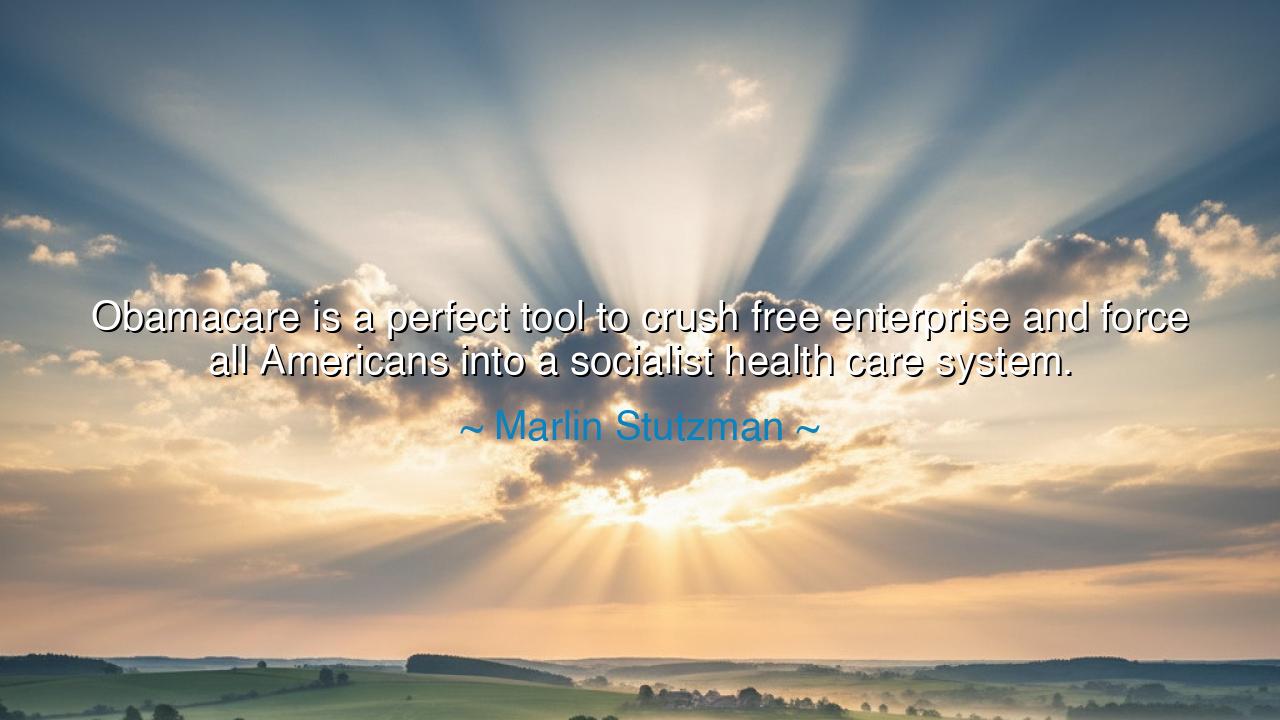
Obamacare is a perfect tool to crush free enterprise and force
Obamacare is a perfect tool to crush free enterprise and force all Americans into a socialist health care system.






The Cry for Liberty Amid Chains of Law
Hear the thunderous words of Marlin Stutzman, a voice of defiance from the heart of a divided nation: “Obamacare is a perfect tool to crush free enterprise and force all Americans into a socialist health care system.” Though spoken in the age of modern governance, his words echo the eternal cry of humankind—the struggle between freedom and control, between the power of the individual and the reach of the state. In this statement lies not mere politics, but the age-old tension that has shaped empires and toppled kings: the question of who commands the body and the will—the person, or the power that governs them.
The Meaning of the Teaching
At its heart, Stutzman’s declaration warns against the slow erosion of individual freedom under the weight of collective authority. The Affordable Care Act, known as Obamacare, sought to reform the system of health and healing, but in doing so, it became a symbol of deeper fears—the fear that liberty, once surrendered, is seldom returned. To Stutzman and those who share his view, the danger lies not in the intent to heal, but in the method: for when the state becomes both the provider and the regulator, it may also become the master of life’s most private domain—health. Thus, his words carry the ancient wisdom that freedom, once bound by law, must struggle to breathe again.
The Origin of the Words
Marlin Stutzman, a congressman from Indiana, spoke these words in the early years following the birth of the Affordable Care Act, a time when America was gripped by fierce debate over the soul of its economic and moral identity. To some, the Act was a triumph of compassion—ensuring care for the poor and security for the ill. To others, it was the dawn of dependency, a step toward a system where free enterprise, that sacred engine of American spirit, would falter beneath regulation. Stutzman, a son of farmers and small business owners, saw in the law not healing, but constraint—a design by which the independence of the citizen would yield to the uniformity of bureaucracy. His words, therefore, were not only a political charge, but a philosophical defense of the self-made individual.
The Tale of the Market and the Monarch
Long ago, in a kingdom of craftsmen and merchants, there arose a ruler who, seeing poverty among his people, decreed that all trade must pass through his hand so that no man might go hungry. At first, the people rejoiced—for none lacked bread. But as the years passed, innovation waned, and spirit withered. The markets, once vibrant, fell silent. The merchants, bound by royal decree, ceased to dream. The people had been fed—but they had lost their freedom. Thus, the kingdom became rich in provision but poor in soul. This parable mirrors Stutzman’s warning: that when compassion becomes control, and when the state governs every choice in the name of good, the very spark that drives prosperity is extinguished.
The Sacred Flame of Free Enterprise
Free enterprise, in Stutzman’s view, is not merely an economic system—it is the expression of human dignity. It is the freedom to labor, to create, to fail, and to rise again by one’s own will. It is the dance of ambition and reward, of innovation and risk. To crush this freedom, even in the name of equality, is to silence the heartbeat of a nation’s vitality. For where the government provides all, it also dictates all—and the people, relieved of burden, may also be relieved of power. Stutzman’s words, therefore, remind us that independence and responsibility are bound together; to surrender one is to endanger the other.
The Balance Between Freedom and Compassion
Yet wisdom demands discernment. Compassion is not the enemy of liberty—but neither can liberty thrive without restraint. The challenge of governance lies in balance: to lift the weak without chaining the strong, to heal the sick without suffocating the healer. Throughout history, societies that forgot this balance fell into ruin—Rome under bureaucracy, the Soviet empire under command. Stutzman’s caution, though sharpened by partisanship, echoes the timeless lesson of governance: power once centralized will not easily disperse. Thus, the wise must build systems that protect both mercy and autonomy, lest one devour the other.
The Lesson for the Generations
Therefore, O listener, let this truth be carved upon your heart: freedom must always be guarded, even in the name of good. When laws are made to help, test whether they also bind. When power grows to protect, watch whether it also controls. Do not let the convenience of the moment blind you to the cost of surrender. Support the care of the weak, yes—but let it be born from voluntary strength, not enforced conformity. For the greatest societies are not those where all are cared for by decree, but where all are empowered to care for themselves and others.
The Eternal Counsel
So let the words of Marlin Stutzman echo through the corridors of time: “Obamacare is a perfect tool to crush free enterprise and force all Americans into a socialist health care system.” Whether one agrees or not, the spirit of his message remains eternal: beware the slow exchange of liberty for comfort, of self-reliance for dependency. For once a people learn to look to the state for their daily bread, they may forget how to sow their own fields. Let the wise remember that true healing—of body, of nation, of soul—must always begin not from law, but from freedom guided by virtue. Only then shall humanity remain both compassionate and free.






AAdministratorAdministrator
Welcome, honored guests. Please leave a comment, we will respond soon